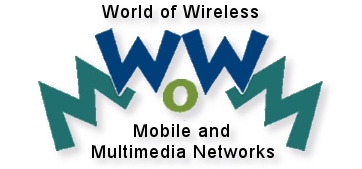Call for Papers
The diffusion of lightweight, powerful portable devices, also enriched with a variety of sensing capabilities, is enabling new ways for users' communication, and laying the foundation for realizing the ubiquitous networking idea. Acting either as the main communication mode or as complement to existing mobile network infrastructures, opportunistic networking can leverage the mobility of end users and enhance their communication capabilities. The opportunistic exploitation of extemporary contacts among the users of the network paves the way to a number of applications but also poses new and challenging problems to the networking research community. The AOC 2015 workshop aims at serving as a meeting point for people working in the area and a forum for exchanging ideas, discussing solutions, and sharing experiences among researchers, professionals, and application developers, both from industry and academia. As with the previous eight editions of the AOC workshop series, the scope of this year's workshop will remain on general issues related to opportunistic networking and computing. Yet, AOC 2015 will have a primary interest in new directions of opportunistic communications, such as mobile social networking, autonomous solutions for smart cities, big data for autonomic and opportunistic systems service composition techniques, scenarios of co-existence with infrastructure networks, and insights to their operation coming from other disciplines such as game theory and cognitive psychology. The workshop will solicit original papers addressing theoretical and practical aspects of autonomic and opportunistic communications but also papers describing prototype implementations and deployments.
Topics of interest for AOC 2015 include, but are not limited to:
- Techniques for data dissemination and replication
- Context and social awareness mechanisms and algorithms
- Autonomous and self-adaptive systems for smart cities
- Autonomous solutions for IoT and cyber-physical systems
- Big data for autonomic and opportunistic systems
- Mobile social networking algorithms and applications
- Co-existence of opportunistic networks with infrastructure mobile wireless networks
- Mobility models and statistical analysis of mobility traces
- Service composition in autonomic and opportunistic networks
- Cognition-driven information processing and decision making
- Performance modelling, scaling laws, and fundamental limits for autonomic and opportunistic communications
- Participatory and urban sensing in autonomic and opportunistic networks
- Game-theoretic insights to the operation of autonomic and opportunistic networks
- Trust, security, and reputation
- Autonomic and opportunistic communication testbeds and prototypes, measurement data from real experiments
- Socio-economic models for autonomic and opportunistic communications
- Autonomic and opportunistic solutions for mobile cloud applications
- Applications and middleware support
- Routing, transport, and reliability issues
PAPER SUBMISSION AND PUBLICATION
Papers should neither have been published elsewhere nor being currently under review by another conference or journal. Manuscripts are limited to 6 pages, single spacing, double column, and must strictly adhere to the template format. Guidelines on paper submission and formatting are available here.
Accepted papers will appear in the symposium proceedings published by IEEE. There will be no separate registration for workshop, but one single registration will cover both conference and workshops participation. At least one author of each accepted paper is required and present his/her work at the workshop.
Extended versions of workshop selected papers will be
considered
for possible fast track publication on the Computer
Communications Journal (Elsevier).
IMPORTANT DATES
Full papers due: March 27, 2015
Notification: April 30, 2015
Authors' Menu
Important Dates
- Paper Submission Deadline March 14, 2015March 27, 2015
- Acceptance NotificationApril 20, 2015April 30, 2015
- Camera-ready Deadline May 7, 2015
- Workshop date June 14, 2015


